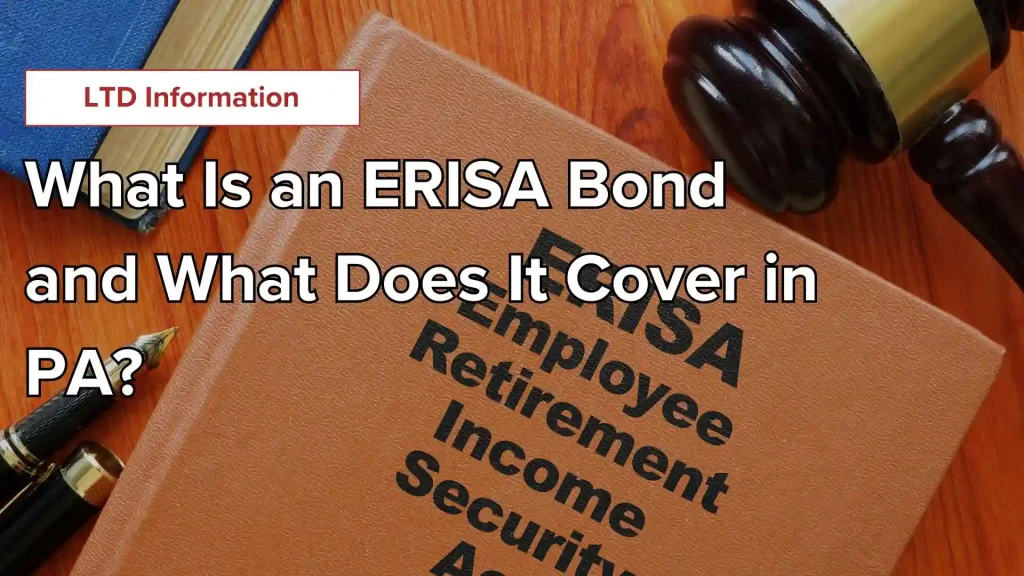Posted on Wednesday, August 14th, 2024 at 9:00 am
 If you’re involved in managing an employee benefit plan in Pennsylvania, you may have come across the term “ERISA bond.” But exactly what is an ERISA bond, and what does it cover? Let’s explore the ins and outs of ERISA bonds, their importance, and their specific application in the Keystone State.
If you’re involved in managing an employee benefit plan in Pennsylvania, you may have come across the term “ERISA bond.” But exactly what is an ERISA bond, and what does it cover? Let’s explore the ins and outs of ERISA bonds, their importance, and their specific application in the Keystone State.
Understanding ERISA Bonds
ERISA, which stands for the Employee Retirement Income Security Act, is a federal law that sets required standards for most retirement and health plans voluntarily established in private industry. An ERISA bond, also known as an ERISA fidelity bond, is a type of insurance required by this law to protect employee benefit plans from losses due to fraud or dishonesty. Understanding what an ERISA bond entails is essential for ensuring the security of your benefits.
What Does an ERISA Bond Cover?
An ERISA bond specifically covers losses resulting from acts of fraud or dishonesty by individuals who handle plan funds. These acts may include:
- Theft
- Embezzlement
- Forgery
- Misappropriation
- Wrongful abstraction
- Willful misapplication
It’s important to clarify that ERISA bonds do not cover losses due to poor investment decisions or general mismanagement. They are specifically designed to protect against criminal acts that could deplete plan assets.
ERISA Bond Requirements in Pennsylvania
While ERISA is a federal law, its requirements apply uniformly across all states, including Pennsylvania. Here are some key points to understand about ERISA bond requirements:
- Coverage Amount: The bond must be at least 10% of the amount of funds handled, with a minimum of $1,000 and a maximum of $500,000 (or $1,000,000 for plans that hold employer securities).
- Who Needs a Bond? Generally, anyone handling funds or other plan property must be under bond. This typically includes the plan administrator and those responsible for managing plan assets.
- Approved Providers: The bond must be issued by a surety or reinsurer named on the Department of the Treasury’s Listing of Approved Sureties.
- No Deductibles: ERISA bonds cannot have a deductible. The entire amount of the bond must be available to cover potential losses.
- Annual Review: You should review the bond’s adequacy annually and adjust the amount as required when the plan’s assets change.
What Amount of ERISA Bond Do I Need?
Determining the appropriate amount of ERISA bond coverage can be crucial for plan administrators in Pennsylvania. The Department of Labor notes that a bond must exist for each trustee, fiduciary, or named administrator equal to at least 10% of the total amount of funds. If the plan holds non-qualifying assets, the bond amount should be higher.
It’s always advisable to consult a legal professional or an experienced ERISA consultant to ensure you’re adequately covered.
ERISA Bond Insurance: More Than Just Compliance
While obtaining an ERISA bond is a legal requirement, it’s also a valuable form of protection for your employee benefit plan. ERISA bond insurance provides peace of mind for administrators and plan participants, as the bond protects all their investments against potential losses due to fraudulent activities.
Moreover, proper ERISA bond coverage can help you avoid penalties and legal issues. The Department of Labor can impose significant fines for non-compliance with ERISA bonding requirements.
ERISA Bonds vs. Fiduciary Liability Insurance
 It is crucial to understand that an ERISA bond is different from fiduciary liability insurance. While an ERISA bond protects the plan and its participants from losses due to fraud or dishonesty, fiduciary liability insurance protects the fiduciaries from personal liability if they breach their fiduciary duties.
It is crucial to understand that an ERISA bond is different from fiduciary liability insurance. While an ERISA bond protects the plan and its participants from losses due to fraud or dishonesty, fiduciary liability insurance protects the fiduciaries from personal liability if they breach their fiduciary duties.
In Pennsylvania, as in other states, it’s often recommended that plan fiduciaries have both types of coverage for comprehensive protection.
The Importance of ERISA Bonds in PA
For employee benefit plans in Pennsylvania, ERISA bonds serve as a critical safeguard against potential losses due to fraudulent activities. They provide an essential layer of protection for plan participants and help ensure compliance with federal regulations.
If you’re managing an employee benefit plan in Pennsylvania, it’s crucial to understand your ERISA bonding requirements and ensure you have adequate coverage. Regular reviews of your bond amount, especially as your plan assets grow, can help you stay compliant and protected.
While ERISA bonds are a legal requirement, they’re also valuable in maintaining the integrity and security of your employee benefit plans. If you have questions about ERISA bonds or need assistance with any aspect of employee benefit plan management, don’t hesitate to seek professional legal advice.
At Capitan Law, our Philadelphia ERISA benefits claims attorneys have extensive experience with ERISA and employee benefits law. Our attorneys can help you understand the complexities of ERISA compliance, including bonding requirements, to ensure your plan and its participants are fully protected. Contact us online today or call us at (267) 419-7888 for a free consultation to discuss your specific needs and how we can assist you in safeguarding your employee benefit plans.
Related Posts:
How Do I Know If I Have an ERISA Plan or a Non-ERISA Plan?
What Is an Employee Welfare Plan Exempt From ERISA Regulations?
New ERISA Regulations: “Deemed Exhausted”
What Is ERISA for Long Term Disability Insurance?
What is ERISA, and How Does It Affect Your Long-Term Disability Claim?